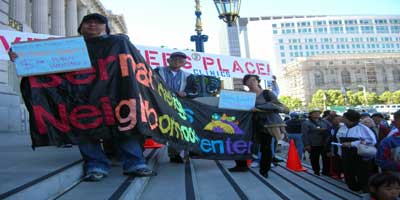The people's budget gets sabotaged by Mayor Newsom.
 |
|
by Sam Drew/Poverty and Race Scholar/PNN community journalist Let me get this straight. San Francisco has an unexpected surplus of $130 million in its budget. The Board of Supervisors voted $28 million for affordable housing in one of the most unaffordable cities on the planet and the Mayor vetoes the appropriation and refuses to spend the money! But wait, the story gets even stranger. This is the same city that wonders why working class families are leaving in droves and openly asks what it can do to maintain it diverse population. Doesn't make a damn bit of sense does it? To fight against the senselessness and injustice in the mayor's decision, representatives from The Coalition on Homelessness, as well as POOR Magazine poverty scholars, Supervisor Chris Daly, State Senator Carole Migden and several other community organizations stood on the steps in front of San Francisco's ornate City Hall. These groups had merged together as one to collectively slap some sense into the mayor and to demand that the money that was earmarked for public housing repairs and services and affordable housing be restored. John Avalos, aide to Supervisor Daly wasted little time getting to the The need for this money is painfully obvious in a city whose housing market has become increasingly unaffordable. The reason this money is needed, as Avalos simply stated, is "to keep San Francisco working people living in the city." Housing in San Francisco is three times as expensive as the national average. In the Bay Area affluent housing markets are getting stronger, while the housing market in poorer areas is softening and hardly any lower income families can afford to purchase housing. The median price for an existing single family dwelling in the Bay Area hit a record high of $720,000 in April. Jazzie Collins addressed one of the most vexing issues about affordable housing, which is the problem with the definition of affordability itself. "Let us take the lead in [making] affordable This tug of war over appropriations and budget supplements goes to the heart of what this city stands for. Can San Francisco become a "family Skyrocketing housing costs make middle and low-income families more vulnerable to homelessness if they lose their jobs. One of the fastest growing segments of the homeless population is children Poverty scholar and POOR Magazine representative Jewnbug gave arousing speech focusing on her housing difficulties. "I was homeless at the age of 8. I'm still struggling to live in San Francisco. The The percentage of San Francisco Bay Area households who could afford a median price house fell from a paltry 20% in July 2003 to under 10 per cent in 2006. The question arises if the city doesn't assist those in need of housing. Then who does it benefit with its surplus? "Who is getting housed in this city? - its huge corporations like Lennar," exclaimed tiny aka Lisa Gray-Garcia editor of POOR Magazine and poverty scholar. Lennar Corporation is the Miami based company in charge of the asbestos laden redevelopment project at the Hunters Point Shipyard. This billion-dollar company has had the red carpet rolled out for it while doors are being closed on the homeless, poor and working families. SRO Collaborative Families with children living in SRO Hotels are Homeless families are severely neglected by the Mayor's budget. Whiles there are over 2,000 homeless families in San Francisco, there is nothing in the budget to address this crisis. $5,000,000 is needed in operating subsidies to ensure the poorest families can move into City and redevelopment funded affordable housing units going on line next year. All one has to do is look at Mayor Newsom's donation chart to see where the deep pockets are in San Francisco. The largest per person donation came from the Financial District at $388.57 per person on a population of 374. Next highest was Embarcadero/Gateway at$75.32 on a population of 3,335. One way I can try to make sense of the whole mess is try to define it Sometimes cities hit the jackpot and revenues flow. But more often the When it comes to housing the poor, there always seems to be an excuse, whether deficit or surplus. If there is a surplus we have to save for a rainy day. If it's a deficit we have to slash funds starting with you! Weighing in on the side of flesh and blood was Valerie Tulier District Representative for State Senator Carole Migden, who said, "Senator Migden absolutely supports the community and their demands for affordable housing in San Francisco... she also wants to ensure affordable means affordable. We have to understand the strategy to address different levels." What makes this 5o'clock veto particularly galling is that last year's affordable housing supplemental passed without the political intrigue San Francisco is missing out on a golden opportunity to follow Speak out against the mayor's new budget Wednesday June 20 at noon at City Hall. |



